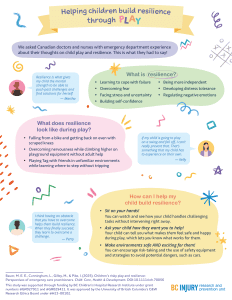
Can play help children develop resilience – Findings from a study with doctors and nurses across Canada
Thank you to Michelle E. E. Bauer, Research Associate, Department of Pediatrics, Faculty of Medicine, UBC, for providing this post.
Findings from this work are available in the following open-access article: Risky Play and Resilience
If you were to ask people if exploring the world, facing challenges, and overcoming obstacles could help people become more resilient, what do you think they would say? Well, they’d probably say “yes, of course!” It makes sense that learning how to overcome challenges in our life can help us develop strategies that make us feel safer and more confident in overcoming similar challenges later on. But how does play, specifically in childhood, support development of resilience?
In 2024, researchers from UBC – Dr. Michelle E. E. Bauer, a Research Associate in Pediatrics, Dr. Ian Pike in the Department of Pediatrics, and Dr. Meghan Gilley, an emergency room practitioner at the BC Children’s Hospital – conducted a project to understand emergency room doctors’ and nurses’ perspectives on children’s play safety, and they investigated how exposure to severe injuries and death in emergency rooms resulting from play-related activities could cause practitioners to re-evaluate their play safety practices at home.
As part of this work, the researchers were interested to know if exposure to severe injuries (e.g., head wounds and multiple fractures) may make practitioners wary of supporting play that could result in children experiencing these injuries, or if the exposure taught them what to do or not do to keep children safe while playing. They sought to understand how play may help children become more resilient, by asking doctors and nurses “What activities, environments, and social circumstances could help children feel more confident and capable to tackle real-world challenges?”
After interviews with 56 doctors and nurses from British Columbia, Ontario, Alberta, Quebec, and the Northwest Territories, they found that the practitioners believed play is an essential part of learning how to overcome obstacles and navigate potential threats without relying on another person’s intervention. The practitioners believed that when children learn to overcome challenges on their own and navigate failure, such as when they fall off a bike and get back on to try again, or when they keep sliding down a climbing wall and need to start over, they learn important lessons, including:
- It is important to persevere in order to accomplish tasks
- Minor pain, such as from scrapes and bruises, happens frequently in life, and we must carry on despite this pain
- To overcome fear, we first need to experience it and learn how to cope with it
Some of the doctors and nurses said that, sometimes when children are injured and need attention in emergency rooms, it’s because the child did not know how to safely navigate a potential threat, or they did not know what pain the activity could cause them. They believed that when children have time to understand the consequences of their actions and to learn how to successfully overcome anxiety-inducing situations, they can become less anxious over time when facing similar environments (e.g., knowing how to pet dogs without scaring them and being bitten). This in turn helps them learn to regulate the emotions they experience.
Play that is thrilling, exciting, and challenging, even if it could result in minor pain and injury, is encouraged! It may actually help children develop their social skills as they resolve conflict with peers, learn how to use their bodies in ways that support their mobility, such as running and climbing, and boost their self-esteem. In a world where childhood rates of anxiety and depression are a pressing public health concern, and restrictions to move freely and explore the world are sometimes limited, making sure children have opportunities to experience challenge, excitement, and yes, even failure, is especially important if we are to support children in becoming independent, happy, and well-adjusted adults!
For any inquiries about this study, please contact Michelle.Bauer@bcchr.ca.
This study was supported through funding by BC Children’s Hospital Research Institute under grant numbers #GR027911 and #GR029411. It was approved by the University of British Columbia’s C&W Research Ethics Board under #H23-00102.


